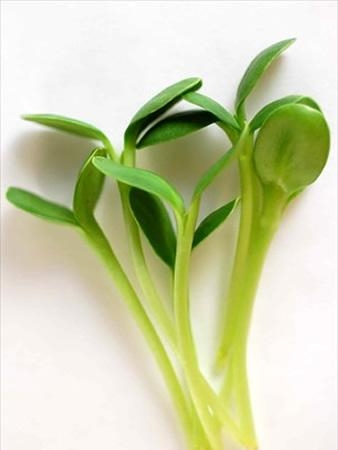
Shipard says that sunflower sprouts are made of 24% to 30% protein with 8 essential amino acids present. Futhermore, she says, the following vitamins and minerals are present in varying amounts:
Vitamin A, Vitamin B1, Vitamin B2, Vitamin B3, Vitamin B5, Vitamin B6, Vitamin B12, Vitamin B15, Vitamin C, Vitamin D, Vitamin E, Vitamin F, Vitamin H, Vitamin K, Choline, Folic Acid, Inositol, PABA, Calcium, Cobalt, Copper, Flourine, Iodine, Iron, Magnesium, Manganese, Phosphorous, Potassium, Selenium, Silicon, Sodium, Sulphur and Zinc.
Shipard also states that, “Due to the enzymes that are activated during sprouting, the sprouts are more easily digested than the dry seeds… The sprouted greens are a richer source of vitamins than the dry seeds… Young leaves of sunflower lettuce are rich in cholorphyll.” Reference: Herbs are Special – Free Sunflower Sprout Nutrition Information
Because all of our sunflower microgreens are grown in our own nutrient rich worm castings from seed to harvest, we are allowing the highest degree of nutrient uptake possible into the sunflower microgreens.
Living Whole Foods, Inc. states that Sunflower Sprouts are “High in fiber, protein, essential fatty acids, vitamins A, B complex, C, D and E. They also contain calcium, phosphorous, iron, iodine, potassium, magnesium and the trace elements zinc, manganese, copper and chromium.” (P. 29 “Wheatgrass, Sprouts, Microgreens and the Living Food Diet”)
We consider this confluence of well-referenced, well-researched, independent sources to be very reliable, and they echo also are reasonably in line with well known information regarding sunflower seed kernels, which is provided below.
Because microgreens are increasing in popularity all over the United States, they are considered an emerging food product. As such, there has been some research done on their nutrition. For example, the University of Maryland and the USDA did an analysis of the nutrient levels in microgreens. They found that microgreens generally have more vitamins and other nutrients than their fully mature counterparts, and in some cases as much as a 40 times greater concentration. Source: Journal of Agricultural and Food Chemistry
There is also nutrition information floating around the internet for “Sunflower Greens” that looks like the following on top:
3oz Sunflower Greens
NUTRITION FACTS
Serving Size 1cup (85 g)
We did not list the rest of this information set because we do not consider this to be reliable. Although the source is listed as the “USDA National Nutrient Database” when we try to find this information in the actual USDA database, it is simply not present. The database DOES NOT actually contain nutrient information for sunflower greens at all. Therefore, we are not including it here.
There is widely available information as to the nutrition of sunflower seeds, and if we consider how sunflower microgreens grow from the kernel itself in a metamorphic process that sees the kernel disappear entirely, it logically would make sense that the vast majority of the nutrition which is in the seed is maintained in the microgreen, just maybe a little different. As Shipard says, enzymes activated during sprouting cause the vitamin and mineral content to increase in the sprouted greens. We can also readily deduce that much of the oil contained in the seed is carried through to the microgreen based on the oily aftertaste of the greens themselves.
Therefore, it seems plausible to infer that much of the below information about the seed carries over, and is possibly enhanced by, the conversion of the seed to a microgreen. For example, consider the emergence of Vitamins B12, D, and K upon activation of enzymes and exposure to light. This table below is for approximately 4 ounces by weight, or 1/4 pound, dried sunflower seed kernels.
Agricultural Research Service, United States Department of Agriculture
National Nutrient Database for Standard Reference Release 26
Full Report (All Nutrients): 12036, Seeds, sunflower seed kernels, dried
(Click above link to view USDA database) Lookup Date: Jan 22, 2014
Food Group: Nut and Seed Products
Scientific Name: Helianthus annuus
Carbohydrate Factor: 4.07 Fat Factor:8.37 Protein Factor: 3.47 Nitrogen to Protein Conversion Factor: 5.3
Refuse: 46% Refuse Description: Hulls